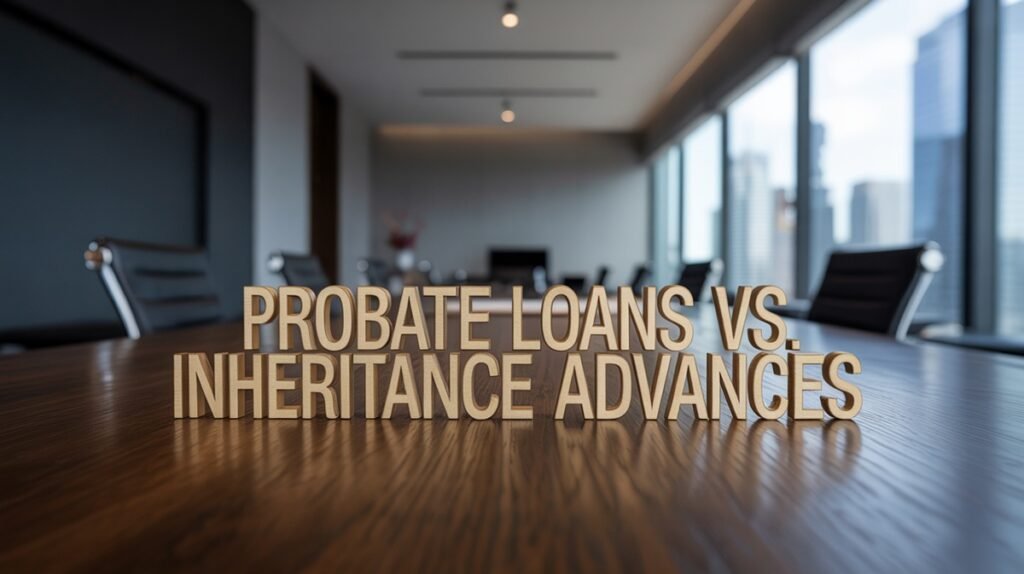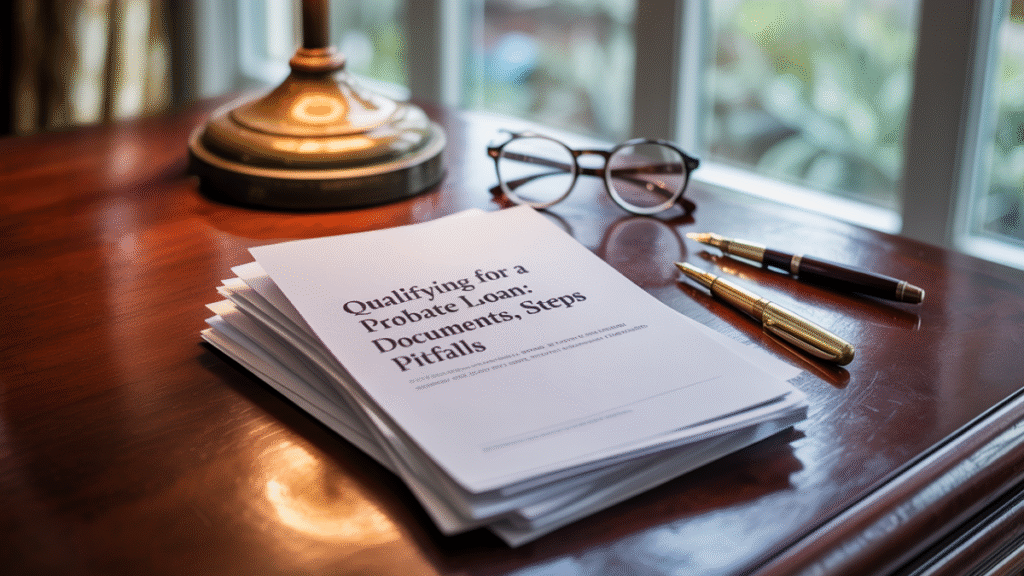| Factor | Description |
| Total Asset Value | Overall worth of estate property, investments, and cash. |
| Debt Amount & Type | Level of debt and whether it’s secured or unsecured. |
| Inheritance Share | The percentage of the estate you are entitled to receive. |
| Probate Timeline | Estimated time for the estate to settle. |
| Asset Liquidity | How fast can you turn assets into cash |
💰 Probate Isn’t Free
Court costs, appraisals, attorney fees — they add up fast.
Estimate your total out-of-pocket costs before you get surprised.
→ Calculate Your Probate Fees
Understanding Probate Advances
A probate advance is a way to get part of your inheritance before the probate process is complete. Instead of waiting months or years, you can receive a lump sum now, with repayment taken from your share of the estate once it’s settled.
- Not a Loan: There are no monthly payments or interest rates.
- Approval Based on Inheritance: Decisions are made based on the value of your share, not your credit score.
- Faster Access to Funds: You can get money within days rather than waiting for the probate process to finish.
This arrangement is often useful when you have immediate expenses like rent, medical bills, or living costs while waiting for probate to wrap up.
How Estate Debt Comes Into Play
Estate debt includes all financial obligations left by the deceased, such as mortgages, taxes, loans, and credit card balances. These debts are paid first before any inheritance is distributed.
- Impact on Approval: If the estate’s assets greatly exceed its debts, approval is more likely. If debts consume most of the estate’s value, approval becomes harder.
- Example Scenario: An estate worth $500,000 with $450,000 in debt leaves little room for an advance, while an estate with smaller debts is more promising.
Probate advance companies closely review the estate’s financial details to determine if enough value remains after debts are cleared.
Qualifying for a Probate Advance When There’s Debt
It’s still possible to get a probate advance when the estate has debt. The deciding factor is whether the estate’s remaining value after debts is large enough to cover your requested advance.
- Favorable Situations: Estates with significant assets and manageable debts, where your inheritance is a solid amount.
- Challenging Situations: Estates where debt matches or exceeds asset value, making repayment uncertain.
The more debt-heavy the estate, the more cautious the funding company will be.
What Companies Look At in Debt-Heavy Estates
When reviewing applications involving debt-heavy estates, companies consider several factors:
- Total Asset Value: The overall worth of real estate, investments, and personal property.
- Debt Amount and Type: Secured debts like mortgages versus unsecured debts like credit cards.
- Inheritance Share: The percentage you are entitled to receive.
- Probate Timeline: How long it is expected to take to settle the estate.
- Liquidity of Assets: How easily the estate’s assets can be converted to cash.
Each factor helps the company determine whether issuing an advance is a reasonable risk.
Tips to Boost Your Chances of Approval
If you’re applying for a probate advance when there’s debt involved, taking the right steps can improve your approval odds.
- Document Assets and Debts: Work with the executor to get clear, up-to-date records.
- Clarify Your Share: Make sure your inheritance percentage is properly recorded in the will or court documents.
- Request a Smaller Amount: Asking for less may increase your approval chances.
- Respond Quickly: Provide any additional documents the company requests without delay.
Being organized and transparent makes the process smoother for everyone involved.
Things to Keep in Mind Before Accepting an Advance
A probate advance gives you quick access to money, but it comes with considerations—especially if the estate has significant debt.
- Reduced Inheritance: If debts turn out to be higher than expected, you may get less money at the end.
- Fees Involved: Advance companies charge fees that reduce your total inheritance.
- Potential Delays: Debt disputes or valuation disagreements can slow down probate, delaying final payouts.
Weigh these points carefully before agreeing to an advance.
Alternatives to a Probate Advance
If the debt level makes a probate advance impractical, there are other ways to access funds while waiting for probate to close.
- Personal Loans or Lines of Credit: Work if you have good credit and steady income.
- Borrowing from Family or Friends: Can be a temporary, lower-cost solution.
- Partial Estate Distributions: Sometimes, executors can release part of your share early if the estate has available liquid assets.
Every option has trade-offs. Choose what suits your finances.
Conclusion
Getting a probate advance when an estate is in debt is possible, but it depends on the numbers. The estate must have enough value left after debts are paid, and your share needs to be large enough to make repayment certain. The key to success is knowing the estate’s true worth, requesting a realistic amount, and understanding the terms before you commit.
Key takeaway: A probate advance is still an option even if the estate has debt, but approval depends on the balance between assets and liabilities. Being prepared and informed gives you the best chance at getting approved.
FAQs
How long does probate usually take?
Probate can take anywhere from several months to over a year, depending on factors like debt disputes, asset complexity, and court schedules.
Do I need to tell other beneficiaries if I get an advance?
No. The agreement is between you and the advance company, although the executor will be notified.
What paperwork will I need to apply?
You’ll typically need the death certificate, probate filings, the will or intestacy documents, and a statement from the executor showing your share.
Can I get an advance on property instead of cash?
Yes. If the property is part of the estate, it can be used to determine your share and qualify you for an advance.
What happens if my final inheritance is less than the advance?
The advance company’s contract will outline this situation, and you may be responsible for covering the difference depending on the terms.



